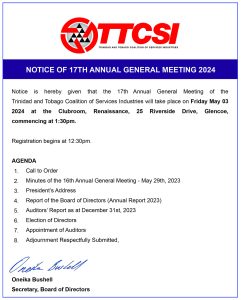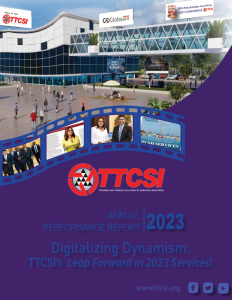Media Release
November 6, 2013
TTCSI’s CEO calls for CARICOM to stop talks with DR until Haiti citizenship issue is resolved
Nirad Tewarie, Chief Executive Officer of Trinidad and Tobago Coalition of Services Industries (TTCSI) made the call for CARICOM to act in the recent Dominican Republic – Haiti citizenship debacle, where over 210,000 Dominicans of Haitian descent were rendered stateless.
Tewarie was speaking at TTCSI’s 6th Annual Excellence in Services Awards 2013 on Tuesday 5th November at the Trinidad Hilton Hotel,
In light of the retroactive ruling (that would essentially date back to those persons born since 1929), Tewarie made the call for CARICOM to publicly and formally suspend its consideration of the DR’s request to join the CARICOM until the DR Government has reversed this injustice through legislative action.
After skilfully demonstrating the impact that this situation could have for the services industries in the affect countries and in the region, he also used it as a call for CARICOM to be more proactive. Moving further afield, the TTCSI CEO expressed support for trade in services liberalization, but reiterated the need for international trade rules to be enforceable to protect the interests of both large and small economies. He used the Antigua Gambling Dispute at the WTO as an example. Saying that is was shameful that Antigua’s development of a successful industry was shut down by US actions which the WTO has deemed to be contrary to international trade rules, the outspoken services trade advocate called on CARICOM to be more forceful in efforts to reform the international trading system to protect the interests of small economies.
Tewarie also advocated increased engagement and participation in the multilateral Trade in Services Agreement (TiSA) that is being negotiated alongside the Doha Development Agenda. This, he felt, would help to ensure that the special and differential treatment given to developing countries would become a critical feature of the TISA, which is expected to become part of the multilateral system in the future. He warned that if no CARICOM country joins the negotiations and a deal is reached, entering after would be far more disadvantageous than participating at this stage in a bid to advance the region’s trade in services interests. In this regard, he suggested that Trinidad and Tobago should join the TiSA negotiations and act as a liaison to the rest of the CARICOM.
Another area where Tewarie called for engagement was in the renewal of the CBI/CBERA trade preferences that CARICOM currently enjoys with the United States. Upon renewal, stakeholders would like to see the expansion of these trade preferences to include trade in services. While the benefits that the CBI has brought to-date cannot be underestimated, an expansion into services would definitely take into consideration the structure of CARICOM economies, which are heavily skewed toward services trade, and the importance of services to the countries. To help achieve this goal, the TTCSI is spearheading an initiative called SOCA (Services of the Caribbean), which is expected to be launched in Washington DC later this month. Tewarie, as chairman of SOCA has since engaged both public and private sector stakeholders, locally and regionally to assist in lobbying the US legislature to expand the agreement into services. Because the CBERA was effected as US legislation (and not a treaty), as of November 2013, SOCA, through the TTCSI, it has submitted comments to the US Trade Representative on the expansion of the CBI (this is the process to follow when the US government proposes amendments to its legislation, stakeholders are invited to submit comments).
Tewarie’s main point was that in order to create the future we want as region, it is essential that we not only identify and articulate our interests, but also raise our collective voice against injustice and strategically engage players or gatekeepers to our attainment of these goals.





